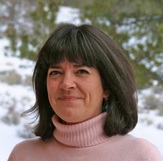About our authors
 Karla Oceanak Karla Oceanak
Karla Oceanak is the author of the Aldo Zelnick Comic Novel Series, which has been honored with a Top 10 Educational Products of 2011 Award, a Book of the Year award (Foreword Reviews), a Colorado Book Award, and a Mountains & Plains Independent Booksellers Regional Book Award, among others. She has worked as a writer and editor for more than twenty years and has ghostwritten dozens of books. Karla and her husband, Scott, live in Colorado with their three teenage boys in a house strewn with Legos, hockey gear, Pokemon cards, video games, books, and dirty socks. More at karlaoceanak.com
 Jean Hanson Jean Hanson
Jean Hanson is the author of The Five Thousand Friends of Veronica Veetch. Her award-winning short stories and essays for adults have been published in numerous magazines, including North American Review, Zoetrope, Indiana Review, Nimrod, New Letters, and Alaska Quarterly Review.
A graduate of the Iowa Writers Workshop, she has received a Pushcart Prize nomination, an artist fellowship in fiction from the Colorado Council on the Arts, the Hackney Prize, the Writers Repertory Award, the Literal Latte Essay Prize, and a Writers Exchange Award from Poets & Writers. Jean lives in Colorado with thousands of "friends" and two clever cockatoos. |
Tips for beginners1. Write. A lot.
Many beginning writers get a story down on paper and think it's good to go. We wish this were true! But alas, learning to write well usually takes thousands of hours of practice and study. You wouldn't expect the first painting you ever made to be gallery-worthy, would you? 2. Join a writers' group. All writers need feedback from critical readers (as opposed to our mothers, who tell us everything is wonderful). 3. Read. A lot. Read widely, but also read deeply in the genre in which you want to write. Teach yourself to read as a writer reads—seeing the story's structure and craft techniques. 4. Know your genres Writing books is a lot like, say, cooking. When it comes to recipes, we tend to group foods by category—breakfast, lunch, snack, entree, side dish, etc. The book industry is similar. Every genre has its own conventions—word count range, protagonist parameters, illustration conventions, etc. Your debut work probably won't be taken seriously if it doesn't at least nod at the rules. An early reader with looooong sentences? Probably not. A YA novel with a middle-aged main character? Not so much. 5. Master the basics Here at Bailiwick, we get a lot of submissions from beginners who don't yet have a handle on the fundamentals of audience, point-of-view, voice, scene, showing versus telling, dialogue, etc. How to gain that mastery? Steps 1 through 3. |
